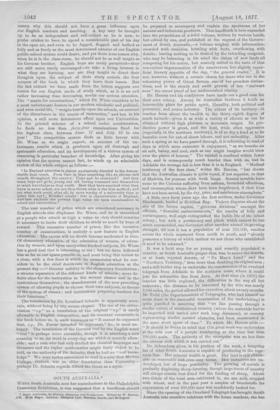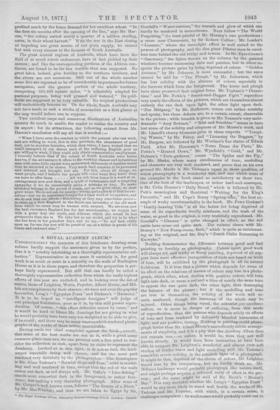SOUTH AUSTRALIA.* WHEN South Australia sent her contributions to the
Philadelphia Centenary Exhibition, it was suggested that a handbook should
'0 South Australia, its History, Resources, find Productions. Edited by W. Harcus, With Maps. London: Sampson Low, Marston, Searle, and Ilivington.
be prepared to accompany and explain the specimens of her natural and industrial products. That handbook is here expanded into the proportions of a solid volume, written by various hands, but edited by one, and published at the request of the Govern- ment of South Australia,—a volume weighty with information, crowded with statistics, bristling with facts, overflowing with details ; leaving nothing to be desired by the intending emigrant, who may be balancing in his mind the claims of new lands all competing for his notice, but scarcely suited to the taste of that convenient impersonation of the omnivorous but slightly super- ficial literary appetite of the day, " the general reader." It is not, however, without a certain charm for those who see in the colonising power of Great Britain one of her proudest distinc- tions, and in the steady and swift growth of her "stalwart sons the surest proof of her undiminished vitality.
Mr, Hams and his coadjutors have made out a good case for their own colony. Among its Australian brethren it holds an honourable place for public spirit, liberality, both political and pecuniary, and active industry. The extent of its territory—it reaches from about the twelfth to the thirty-eighth degree of south latitude—gives it as wide a variety of climate as can be obtained without high plateaus or mountain ranges. Its pro- ductive power is great, and the heat, while often oppressive (especially in the northern territory), is of so dry a kind as to be bearable even for out-of-doors labour, and not unhealthy. After such a spring as we have passed through, it is refreshing to read of days in which mere existence is enjoyment, " as we breathe an air soft, balmy, and cool, such as one might imagine would blow over the plains of heaven." The rainfall is confined within fewer days, and is consequently much heavier than with us, but in Adelaide the average fall is less than it is in England. "Medical testimony of the first class," writes Mr. Harcus, " has shown that the Australian climate is quite equal, if not superior, to that of Madeira, for persons with weak lungs. Several invalids have come to the Colonies suffering from asthma, bronchial affections, and consumption whose days have been lengthened, if their lives have not been saved, by the dry, pure, and salubrious atmosphere."
A little over forty years ago the first settlers, under Governor Hindmarsh, landed in Holdfast Bay. Violent disputes about the site of the future capital, " grievous divisions" amongst the officials, "financial embarrassments," the results of folly and extravagance, well-nigh extinguished the feeble life of the infant colony ; but with a persistency and pluck which cannot be to much commended, one Governor after another nursed its growing strength, till now it has a population of near 210,000, reaches across the whole continent from north to south, and " already possesses a history of which neither we nor those who established it need to be ashamed."
It was a bold step for so young and scantily populated a country, as South Australia proper then was, to annex the deserts, or at least, reputed deserts, of " No Man's Land" and the "Northern Territory," thus more than doubling its original area ; and a still bolder step to undertake the construction of an overland telegraph from Adelaide to the northern coast, where it could join the submarine line from Java. At that time (in 1870) the interior was little explored, the difficulties in the way all but unknown ; the distance to be traversed by the wire was nearly 2,000 miles, the period allowed for execution about twenty months. Mr Todd (the Superintendent of Telegraphs, who had himself no mean share in the successful termination of the undertaking) is quite justified in asserting that " no line passing through a similar extent of uninhabited country (where the materials bud to be imported and carted over such long distances), or country representing similar natural obstacles, had been constructed in the same short space of time." To which Mr. Herne adds :- " It should be borne in mind that this great work was undertaken at the sole cost of a people numbering at the time less than 200,000 souls. The audacity of the enterprise was no less than the success with which it was carried out."
Dr. Schomberg gives, in his portion of the work, a tempting list of what South Australia is capable of producing in the vege- table line. Iler mineral wealth is great. Her land is still obtain- able on reasonable and even easy terms. 11er industries are un- developed, but of large possibility. The growing of cereals is gradually displacing sheep-farming, though large tracts of country will always remain best fitted for the feeding of sheep, About two-thirds of the total area cultivated is, we are told, cropped with wheat, and in the past year a surplus of breadstuffs for exportation of over 230,000 tons was confidently looked for.
Since the opening of the Overland Telegraph has brought South Australia into sensitive relations with the home markets, she has profited much by the home demand for her excellent wheat. " In the first six months after the opening of the line," says Mr. Har- cus, " the colony netted nearly a quarter of a million sterling, extra, in their wheat harvest." With the war in the East closing or impeding one great source of our grain supply, we cannot hut wish every success to the farmers of South Australia.
The great central regions of Australia, which have been the ;field of so much heroic endeavour, have at last yielded up their secrets ; and like the corresponding portions of the African con- tinent, are found to be far less terrible than was supposed. No great lakes, indeed, give fertility to the northern territory, and the rivers are not numerous, Stilt out of the whole number some five are reported to be of considerable importance for future navigation, and the greater portion of the whole territory, -comprising 531,402 square miles, " is admirably adapted for pastoral purposes, being well grassed and watered." Its gold- fields are supposed to be very valuable. Its tropical productions will undoubtedly become so. On the whole, South Australia may not have made so rash a stroke of annexation as a first glance at the map would induce one to suppose.
Two excellent maps and numerous illustrations of Australian scenery do much to enable the reader to realise the country and its aspect ; for its attractions, the following extract from Mr. Harcus's conclusion will say all that is needed :-
" When I have soon the comfort in which the poorest who can work, end are willing to work, live in this province, the abundance of good food, not to mention luxuries, which they enjoy, I have wished that we .could transport to our shores such of the suffering English poor as are willing to work, if they could only obtain remunerative employment. I honestly believe that if the colony of South Australia were better known, if the advantages it offers to the working-classes and industrious salon with some little capital were understood, thousands of families would soon be attracted to its shores. Very much land remains to be possessed and subdued and brought into use. For this, above all things, we event people, and I believe the people will come when they know what we have to offer thorn All we ask from home is a word of On• eouragement now and then, and a spirit of forbearance and a forgiving sympathy if we do occasionally make a mistake or two. To make mistakes belongs to the period of youth, and as we grow older, we shall grow wiser. We do not ask for money—wo can make plenty of that for our- selves—but we do sometimes hunger for a kind word of recognition, and Ivfe do ask that our efforts—blundering as they may sometimes prove— to raise up a Now England in the South not unworthy of the old stook from which we came may be treated with respect. We are even now the best customers England has for her merchandise; we supply her with a great deal she needs, and without which she would be loss prosperous than she ie. We take her as our model, and try to be what she has boon in her grandest days, and wo say,—' Do not look coldly upon us, for one day you will bo proud of us, as a father is proud of his brave and stalwart sons."



































 Previous page
Previous page